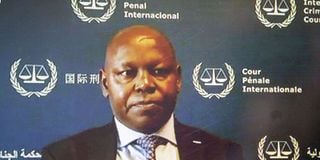Premium
ICC asks for Kenya views on release of Gicheru

Kenyan lawyer Paul Gicheru makes his first appearance before the ICC on November 6, 2020, before Judge Reine Adélaïde Sophie Alapini-Gansou of Pre-Trial Chamber A.
What you need to know:
- Mr Gicheru surrendered to the ICC on November 2, after nearly five years as a fugitive following his indictment for alleged witness tampering in the case against Deputy President William Ruto.
Amid speculations of his motive for surrender, he has told the pre-trial chamber that he did it on his own volition.
The Kenya government is once again on the radar of the International Criminal Court (ICC) after the court invited its views on lawyer Paul Gicheru’s request for conditional release from detention in The Hague.
In the orders issued by judge Reine Adélaïde Sophie Alapini-Gansou on November 12, the government has until November 26 to submit its views on Mr Gicheru’s request to return to the country.
In its submissions, the government will also be required to give certain undertakings “to enforce one or more conditions restricting liberty the Chamber could potentially impose.”
Those conditions include the requirement that Mr Gicheru will not be allowed to travel outside Kenya without the explicit agreement of the Chamber, that he must not go to certain places or associate with certain persons as specified by the Pre-Trial Chamber, that he must not contact directly or indirectly victims or witnesses, that he must not engage in certain professional activities, that he must reside at a particular address as specified by the Pre-Trial Chamber, and that he must respond when summoned by an authority or a qualified person designated by the Pre-Trial Chamber.
“In this regard, the Chamber specifically requests Kenya to provide observations as to its willingness and ability to facilitate the possibility of Mr Gicheru travelling between Kenya and the Netherlands for the purposes of the proceedings in the present case,” the order states.
How the government responds to the orders will be interesting, given that President Uhuru Kenyatta in 2016 vowed that he would not allow another Kenyan to be tried by The Hague-based court.
Fraught relationship
Moreover, in the lead-up to the collapse of the post-election violence cases, ICC Prosecutor Fatou Bensouda had a fraught relationship with the government, which she accused of failing to cooperate with her office as required of a state member.
Mr Gicheru surrendered to the ICC on November 2, after nearly five years as a fugitive following his indictment for alleged witness tampering in the case against Deputy President William Ruto. His surrender caught many in Kenya and at the ICC off-guard.
Amid speculations of his motive for surrender, he has told the pre-trial chamber that he did it on his own volition.
“As to the condition so my surrender I wish to confirm to this court that I surrendered myself first to the Dutch authorities, then to the court. This surrender was without coercion or urging from anybody. I did it on my own volition and at my cost,” he said.
He had been holding senior public service positions for a number of years, the latest being as the chairman of the Export Processing Zones Authority (EPZA).
The ICC prosecutor accuses him of corruptly influencing six witnesses who were set to testify against Dr Ruto by paying bribes and drawing affidavits they used to recant their testimony to the ICC.
He made his initial appearance before the ICC on November 6 and remains at the ICC Detention Centre in Scheveningen region of The Hague in The Netherlands.
Three days after his initial appearance, on November 9 he submitted a request for conditional release back to Kenya from where he will be travelling to attend the court in The Hague.
His co-accused, Phillip Bett, remains at large.
According to the order by judge Alapini-Gansou, “The Prosecutor does not oppose the Interim Release Request”, which means Mr Gicheru could be conditionally set free during the pendency of his case.
Interim Release Request
In the order, the Dutch government has also been asked to submit its views on the request by Mr Gicheru.
“The Chamber invites the Netherlands to submit any observations that it, as the host State, considers relevant to the Chamber’s impending decision on the Interim Release Request, including, in particular, as to its willingness and ability to facilitate the possibility of Mr Gicheru travelling between Kenya and the Netherlands, as well as the possibility of Mr Gicheru temporarily residing in the Netherlands, for the purposes of the proceedings in the present case,” the order states.
The Netherlands government will also be required to submit its views by November 26.
While it almost looks likely that Mr Gicheru will be conditionally set free, he might not be allowed to come back to Kenya unless there is “a firm, demonstrable undertaking” by the government to implement the conditions that will be set by the pre-trial chamber, a source at the ICC told Sunday Nation.
According to the source, past experience with the government of Kenya means they have to treat everything the government will say in its submission with some level of skepticism.




